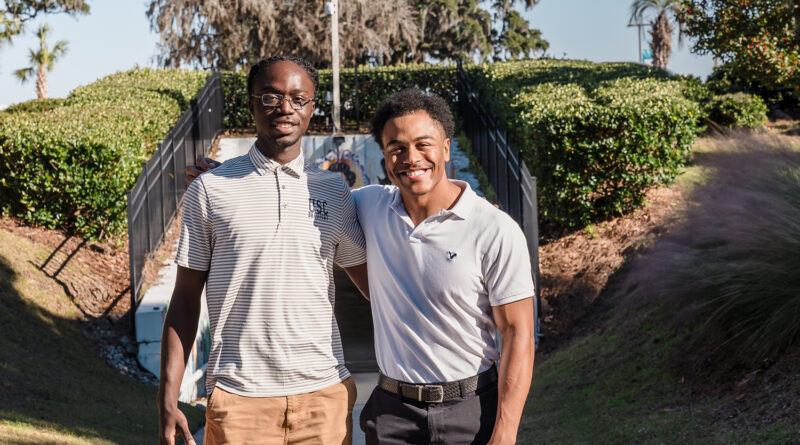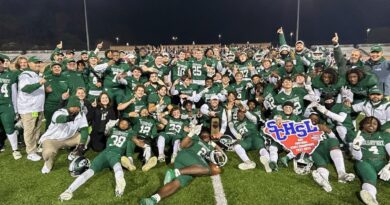THEODORE WASHINGTON AND QUINTILIAN FIELDS JR.
Destined to be Doctors
Two Beaufort County Students Attend Rutgers College Neurological Research Summer Internship Program
story by NAKEISHA DAWSON-THOMPSON photos by SUSAN DELOACH
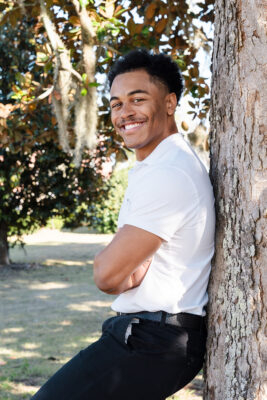 Theodore Washington, affectionately known as Theo, is a native of Lady’s Island in Beaufort, SC. Theo’s family roots in the Lowcountry stem deep. His grandfather served in the US Armed Forces, allowing his mother the opportunity to travel to different locations throughout his career. Theodore attended Coosa Elementary and Lady’s Island Middle, and graduated from Beaufort High School in 2021. Theodore recalls, as a young boy, being drawn to helping his family as they battled medical issues such as systemic lupus erythematosus (SLE or Lupus).
Theodore Washington, affectionately known as Theo, is a native of Lady’s Island in Beaufort, SC. Theo’s family roots in the Lowcountry stem deep. His grandfather served in the US Armed Forces, allowing his mother the opportunity to travel to different locations throughout his career. Theodore attended Coosa Elementary and Lady’s Island Middle, and graduated from Beaufort High School in 2021. Theodore recalls, as a young boy, being drawn to helping his family as they battled medical issues such as systemic lupus erythematosus (SLE or Lupus).
Theodore’s grandmother, aunt, and mother all suffered from autoimmune diseases. His mother and aunt have a diagnosis of SLE. SLE is an autoimmune disease — a disorder in which the body’s immune system attacks the body’s cells and organs. Lupus causes the immune system to make proteins called autoantibodies. These proteins attack tissues and organs in the body, including the kidneys, lungs, brain, and heart. According to the Lupus Foundation of America, SLE affects 1.5 million Americans and 5 million people worldwide. Ninety percent of people living with Lupus are women. Most people with Lupus develop the disease between the ages of 15 and 44. Lupus is two to three times more prevalent among African American, Hispanic/Latina, Asian American, Native American, Alaska Native, Native Hawaiian, and other Pacific Islander women, than among Caucasian women. Recent research indicates that Lupus affects 1 in 537 young African American women.
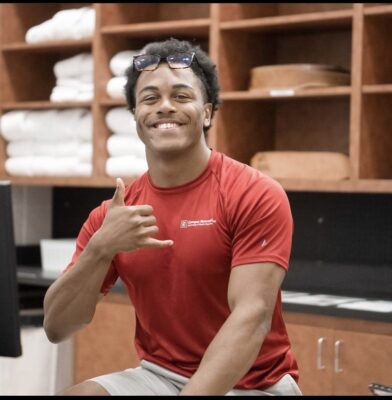 Theodore attended many physician appointments with his family, which he attributes to his desire to study medicine. Attending those appointments and sitting in that environment was a great motivation. When Theo was in high school, he focused on his studies and became very active in sports. Theo played football and wrestling, and ran track and field. He knew he wanted to go to college, but he was undecided on his field of study.
Theodore attended many physician appointments with his family, which he attributes to his desire to study medicine. Attending those appointments and sitting in that environment was a great motivation. When Theo was in high school, he focused on his studies and became very active in sports. Theo played football and wrestling, and ran track and field. He knew he wanted to go to college, but he was undecided on his field of study.
After high school graduation, Theo was a walk-on for The Citadel. It was during this time that he lost his desire to play sports. Theo transferred to USCB Bluffton in the fall as a freshman. At this same time, his aunt’s health began spiraling. It was the very thing that helped push his decision to return to his roots of caring for and supporting his family. Theo would go on to transfer to USC Columbia as a Biological Sciences major, and Medical Humanities and Culture minor.
Theo also put his helpfulness to use, giving back to others while on campus. He was inducted into the Delta Kappa Epsilon fraternity, where he continues to give back through community service. Theo is also a part of the student government and President’s Staff, serving as the Director of Wellness. He currently works on campus at Campus Recreation as the membership service assistant. He felt like the stars began to align at USC Columbia, as he vowed to carry on his aunt’s legacy of helping others in the future.
This past summer, Theodore applied for the Summer Research Internship at Rutgers College Neurological Research Lab in New Jersey. It was there that Theo was given the opportunity to perform neurological research on a level he could never have imagined. Theodore worked alongside the principal investigator (PI), postdocs, and PhD students alike. During this internship, they met weekly to discuss the experiments. At the end of the summer, they all gave a presentation on their research experiments.
Theo’s research study allowed him to work with Associate Professor Haesun A. Kim and Nisha Gautam, a molecular biologist, on a neurological-focused presentation, where he described his findings on the Role of Choline Transporter-like Protein-1 in Schwann Cells. Schwann cells are essentially insulators located in the peripheral nervous system and help neurons communicate their electrical messages throughout the body. Choline is a nutrient taken into the body by diet. It is responsible for the biosynthesis of many phospholipids, which are important for the membrane of the glial cell subtype. Several lab protocols were performed, such as Polymerase Chain Reaction (PCR) and Gel Electrophoresis, to test the specific choline transporter’s importance and role in Schwann cells. Experiments, indeed, proved the importance of transporter proteins as a conclusive result. Due to the success, more experiments can be performed as research progresses to better understand neurological functions.
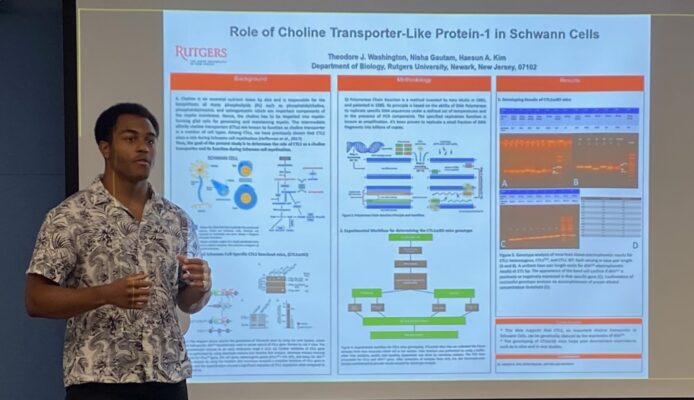
Theo says that before this internship, he hadn’t traveled much. He states that experience … “It was everything!” His advice is “To those who aspire to do and be more, the worlds of science, medicine, and even technology can be treated as different realms within the scope of academia and furthering to career fields. I’ve come to find that for the betterment of all, you cannot permit superior importance to just one singular topic. We need the work of scientists to better medicine. We need the improvement of technology to better our science. We are indebted to great minds that have come before us, carving our paths, and the only way to reimburse them is by using ours.”
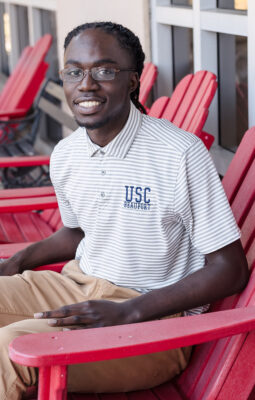 Quintilian Fields Jr. is a native of the Dale community, located north of the Broad River. Quintilian is the eldest of six children to Quintilian and Suzette Fields. Quintilian also has deep roots in Beaufort’s Lowcountry Gullah culture, as his family dates back generations to the St. Helena Island community. He believes in the Gospel of Jesus and attributes his accomplishments to his parents, who consistently prayed for him and his siblings.
Quintilian Fields Jr. is a native of the Dale community, located north of the Broad River. Quintilian is the eldest of six children to Quintilian and Suzette Fields. Quintilian also has deep roots in Beaufort’s Lowcountry Gullah culture, as his family dates back generations to the St. Helena Island community. He believes in the Gospel of Jesus and attributes his accomplishments to his parents, who consistently prayed for him and his siblings.
Quintilian states that he and his family are country at heart. He enjoys playing basketball, bowling, fishing, and ATV riding with his family. Quintilian attended the Whale Branch cluster (Whale Branch Elementary, Whale Branch Middle, and Whale Branch Early College High). Quintilian graduated from WBECHS in 2022 with a dual Associate Degree in Arts and Science. Quintilian currently attends USCB, entering as a junior at 18, studying biology, and planning to apply for their Pre-Med program after graduation.
Quintilian always had an infinite desire to help others. He attributes his decision to study medicine partly to Dr. Edward McNeil, who attends the same church as Quintilian. He recalls watching him interact with people in church and the community. He admired and respected Dr. McNeil’s community presence and commitment to God. It was an inspiration watching an African American man who looked like him and attended the same places as him, achieving a level of education and success while helping so many people.
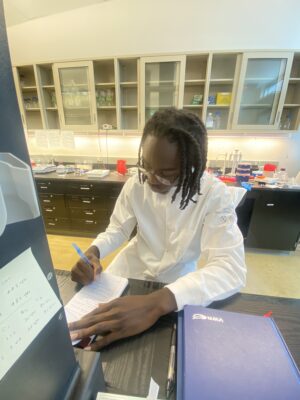 Jalyn Lawrence, his college counselor, encouraged him to apply for the Rutgers College Neurological Research Summer Internship Program. Quintilian was one of 12 college students nationwide chosen for this internship. When he arrived on campus for the internship, he met Theodore Washington, who he quickly learned was also a native of Beaufort, SC. While in attendance, the two became friends and even learned they may be distant cousins.
Jalyn Lawrence, his college counselor, encouraged him to apply for the Rutgers College Neurological Research Summer Internship Program. Quintilian was one of 12 college students nationwide chosen for this internship. When he arrived on campus for the internship, he met Theodore Washington, who he quickly learned was also a native of Beaufort, SC. While in attendance, the two became friends and even learned they may be distant cousins.
Quintilian describes he wanted to go home on the second day of being on campus at Rutgers. He had never been to such a big city, and he was experiencing a major culture shock. After all, he grew up in the country and enjoyed the country lifestyle. However, he was glad he stayed and continued the experience at Rutgers College. The two met several people with different cultural backgrounds and life stories. They formed new relationships and networks with students from other regions and countries. They were able to tour New Jersey, New York, and more.
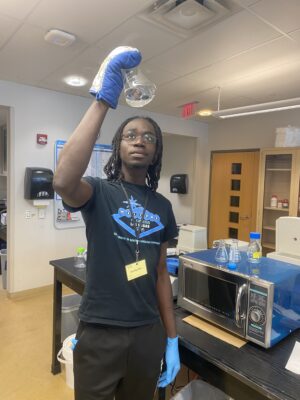 Quintilian’s research focused on DNA nanotechnology, which is defined as engineered devices, structures, and systems at a nanomaterial level. DNA is perfect for nano construction because of its predictable and programmable Watson-Crick base-pairing interactions. Derived from the late Nadrian Seeman, structural DNA nanotechnology allows DNA to be used as physical material for Self-Assembly. They created both 2D and 3D nanostructures using gel electrophoresis and an AFM. The applications of DNA and RNA nanostructures include drug delivery, biosensing, bioimaging, and computing. The initial goal of structural DNA nanotechnology is to organize protein molecules, which in turn leads to increased detection of gene expression. DNA origami starts as lattices. And we create those structures from single-stranded DNA scaffolds, edge-to-edge base stacking, and single-stranded DNA tiles.
Quintilian’s research focused on DNA nanotechnology, which is defined as engineered devices, structures, and systems at a nanomaterial level. DNA is perfect for nano construction because of its predictable and programmable Watson-Crick base-pairing interactions. Derived from the late Nadrian Seeman, structural DNA nanotechnology allows DNA to be used as physical material for Self-Assembly. They created both 2D and 3D nanostructures using gel electrophoresis and an AFM. The applications of DNA and RNA nanostructures include drug delivery, biosensing, bioimaging, and computing. The initial goal of structural DNA nanotechnology is to organize protein molecules, which in turn leads to increased detection of gene expression. DNA origami starts as lattices. And we create those structures from single-stranded DNA scaffolds, edge-to-edge base stacking, and single-stranded DNA tiles.
Quintilian offers these words of advice, “Put God first in your life. It is not by your own will that you will achieve everything your heart desires in life. If you keep God first, He will make a way for you. If you have a goal in life, you need to do everything to help you achieve that goal. Because faith without works is dead. You have to go out and put the work in to achieve that desired goal. Be respectful to everyone; you never know who you may come in contact with and what your impression of them can do for you.”
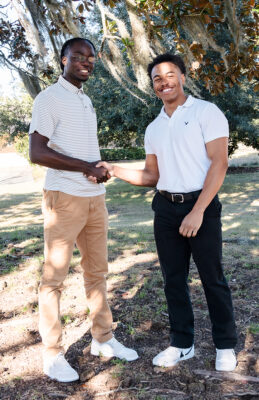
These two young men, born on different sides of the county and attending different school clusters, collided paths while having a life-changing experience. Theo, who had the challenge of watching several of his family members battle Lupus, met Quintilian, who had a different inspiration for his path of medicine. Theo is grateful for his mother’s strength and resilience, and hopes to help find a cure for SLE (Lupus). Quintilian is thankful to his community and WBECHS for the opportunity to participate in the dual enrollment program, which allowed him to enter college as a junior. While this is just the beginning of their journey to pre-medicine pathways, the two are committed to the process and the dedicated work ahead of them. To the future doctors Theodore Washington and Quintilian Fields Jr., the citizens of Beaufort County are proud of you, and are rooting for your continued success and excellence in your respected fields of study. Greatness awaits you!

